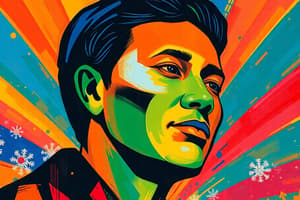Podcast
Questions and Answers
What is the primary definition of patriotism as stated in the document?
What is the primary definition of patriotism as stated in the document?
- A sense of national consciousness
- Support for local products
- Loyalty to ethnic groups
- Love and devotion to one's country (correct)
Which key figure contributed to the emergence of Filipino identity during the Spanish colonial era?
Which key figure contributed to the emergence of Filipino identity during the Spanish colonial era?
- Emilio Aguinaldo
- José Rizal (correct)
- Ferdinand Marcos
- Corazon Aquino
What is a significant challenge to patriotism and nationalism in the Philippines?
What is a significant challenge to patriotism and nationalism in the Philippines?
- Promotion of Filipino languages
- Civic engagement
- Support for local industries
- Globalization and cultural homogenization (correct)
How does the Literacy Training Service (LTS) aim to foster patriotism?
How does the Literacy Training Service (LTS) aim to foster patriotism?
Which of the following is NOT considered an expression of patriotism and nationalism?
Which of the following is NOT considered an expression of patriotism and nationalism?
What role does literacy play in national development, according to the document?
What role does literacy play in national development, according to the document?
During which period did Filipino nationalism see significant development under American influence?
During which period did Filipino nationalism see significant development under American influence?
Which of these activities is associated with promoting civic consciousness in NSTP-LTS?
Which of these activities is associated with promoting civic consciousness in NSTP-LTS?
What is the primary goal of mother tongue-based education?
What is the primary goal of mother tongue-based education?
Which of the following is a key aspect of community-based projects in education?
Which of the following is a key aspect of community-based projects in education?
What skill is emphasized in critical media literacy education?
What skill is emphasized in critical media literacy education?
Which topic is important to integrate into lessons for promoting environmental awareness?
Which topic is important to integrate into lessons for promoting environmental awareness?
How can literacy education influence national identity?
How can literacy education influence national identity?
What is the relationship between patriotism and nationalism in shaping Filipino identity?
What is the relationship between patriotism and nationalism in shaping Filipino identity?
What fundamental idea does true patriotism include?
What fundamental idea does true patriotism include?
What challenge does global citizenship present in today's interconnected world?
What challenge does global citizenship present in today's interconnected world?
Flashcards are hidden until you start studying
Study Notes
Introduction
- Examines patriotism and nationalism in the Philippines within the context of the National Service Training Program (NSTP), specifically Literacy Training Service (LTS).
Definitions
- Patriotism: Love and devotion towards one's country.
- Nationalism: National consciousness that prioritizes one's nation over others.
Historical Context in the Philippines
- Pre-colonial period: Loyalty primarily to local barangays and ethnic groups.
- Spanish colonial era: Rise of a collective Filipino identity and the initial stirrings of nationalism.
- American period: Further shaping and strengthening of Filipino nationalism.
- Post-independence: Ongoing evolution of the concepts of patriotism and nationalism in the Philippines.
Key Figures in Philippine Nationalism
- José Rizal: National hero and reform advocate.
- Andrés Bonifacio: Founder of the Katipunan and leader of the Philippine Revolution.
- Emilio Aguinaldo: First President of the Philippines, revolutionary leader.
- Apolinario Mabini: Political theorist and adviser during the Philippine Revolution.
Expressions of Patriotism and Nationalism
- National symbols: Use of flags and anthems as representations of national pride.
- National holidays: Celebrations that reinforce national identity and historical events.
- Cultural heritage: Efforts in preserving traditions and cultural identity.
- Filipino languages: Promotion and use of various languages spoken in the Philippines.
- Support for local industries: Fostering economic patriotism through local products.
Patriotism and Nationalism in NSTP-LTS
- Civic Consciousness: Cultivating awareness of individual responsibilities in nation-building.
- Community Service: Participation in activities to improve local communities.
- Cultural Appreciation: Emphasis on valuing Filipino traditions and customs.
- Literacy and National Development: Using education to empower individuals and encourage informed citizenship.
Challenges to Patriotism and Nationalism
- Globalization: Threat of cultural homogenization impacting local identities.
- Brain drain: Migration of skilled workers resulting in loss of talent.
- Regional divisions: Ethnic and regional disparities that challenge national unity.
- Political corruption: Erosion of trust in government, affecting national pride.
Fostering Patriotism and Nationalism through LTS
- Education on Filipino history: Integrating lessons on national heroes and cultural practices.
- Local language promotion: Supporting mother tongue-based educational initiatives.
- Community projects: Involving learners in activities that address local issues.
- Critical media literacy: Teaching students to critically evaluate information sources.
- Environmental awareness: Highlighting the importance of Philippine biodiversity and conservation.
Reflection Questions
- Personal contributions to nation-building through NSTP-LTS participation.
- The role of literacy education in strengthening national identity.
- Balancing patriotism with global citizenship in an interconnected world.
Conclusion
- Patriotism and nationalism are vital in shaping Filipino identity and fostering national development, offering NSTP-LTS students valuable opportunities to embody these values. True patriotism involves actively working for the welfare of the country and its people.
Studying That Suits You
Use AI to generate personalized quizzes and flashcards to suit your learning preferences.




